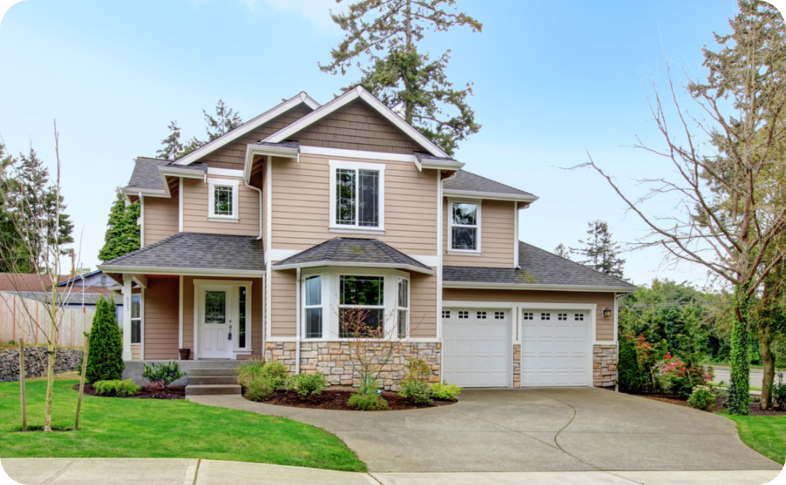More Financial Freedom with a Reverse Mortgage1
Whether you're a senior looking for an additional source of income or a caregiver trying to help a loved one remain independent, a reverse mortgage may be the perfect solution.
Learn More

What's a Reverse Mortgage?
A reverse mortgage1 is a unique type of loan that allows homeowners 62 or older to access a portion of their home's equity without making monthly principal and interest payments. How does it work? Unlike traditional mortgages, where borrowers make monthly payments to their lender, with a reverse mortgage, the lender pays the homeowner. This is why it's called a "reverse mortgage."
What are the Advantages of a Reverse Mortgage?
- Additional Income: Provides a source of supplemental income without having to sell your home.
- Access to Equity: Access the equity you've built up to manage expenses and debt or improve your quality of life.
- No Monthly Payments: Instead, the loan is repaid when you sell the home, move out, or pass away.
- Maintaining Home Ownership: Continue to live in your home and maintain ownership.

Who Qualifies For a Reverse Mortgage?
To be eligible for a reverse mortgage, borrowers must meet certain criteria established by the Department of Housing and Urban Development (HUD)2, including:
- Age: Borrowers must be at least 62 years old.
- Occupancy: The property must be the borrower's primary residence.
- Property type: The property must be a single-family home, a 2-4 unit home with one unit occupied by the borrower, a HUD-approved condominium, or a manufactured home that meets HUD requirements.
- Financing: The property must be free and clear of any outstanding mortgages or liens, or the proceeds from the reverse mortgage must be used to pay off any existing mortgages or liens.
- Property Condition: Your home must be in good shape. If your house does not meet the required property standards, the lender will tell you what repairs need to be made before you can get a reverse mortgage loan.
- HUD Counseling: You must receive counseling from a HUD-approved reverse mortgage counseling agency to discuss your eligibility, the financial implications of the loan, and other alternatives.
Reverse Mortgage FAQs
A reverse mortgage is a type of loan available to homeowners aged 62 or older that allows them to convert a portion of their home’s equity into cash. Instead of making monthly mortgage payments, the loan is repaid when the borrower sells the home, moves out, or passes away. By facilitating a flexible and accommodating approach, reverse mortgages can empower senior homeowners to unlock the value of their home and supplement their monthly finances.
There is an age limit for a reverse mortgage. Specifically, one of the homeowners must be at least 62 years old. This means that homeowners who have reached the age of 62 or older are eligible to apply for a reverse mortgage. This requirement is set by the Department of Housing and Urban Development (HUD)* and is a standard rule across the industry. The age restriction is designed to ensure that the product is used as a long-term financial solution for seniors, helping to supplement their retirement income.
To qualify for a reverse mortgage, there are several key requirements that need to be met. First, you must be at least 62 years of age. Second, you must have equity in your home; in fact, the more equity you have, the more you can potentially borrow. The property in question must also be your primary residence. There are other requirements too, such as keeping the home well-maintained and staying current on property taxes and homeowner's insurance. If you're considering a reverse mortgage, it would be wise to consult with a mortgage professional to understand all the qualifications necessary.
No, you don't need to own your home outright to qualify for a reverse mortgage. However, you must have equity in your home to be eligible. Reverse mortgages allow homeowners to convert a portion of their home equity into loan proceeds, which can be received as a lump sum, monthly payments, or a line of credit.
You can use the money from a reverse mortgage for virtually anything you desire. It is your money, drawn from the equity you've built up in your home over the years. Common uses for a reverse mortgage payout include supplementing retirement income, making necessary home improvements, funding in-home care, or even just enjoying a more comfortable retirement. Some people also use the funds to pay off existing debts, travel, or help family members. In some cases, you could even use the money from your reverse mortgage to purchase another home, although this would typically require a specific type of reverse mortgage known as a Home Equity Conversion Mortgage for Purchase (HECM for Purchase).
No, you cannot have a reverse mortgage on a second home or investment property. A key requirement for a reverse mortgage is that the home must be your primary residence. This is because the reverse mortgage is intended to help seniors stay in their homes by tapping into the home's equity. If the property is not your primary residence—such as a second home or an investment property—it does not qualify for a reverse mortgage. This rule helps to prevent misuse of the product and ensures that it serves its intended purpose—to provide financial support for seniors in their primary residence.
Reverse mortgages come with various costs, and it is important to factor these costs into your decision making. Typical costs associated with a reverse mortgage include:
- Origination fees
- Closing costs
- Mortgage insurance premiums
- Interest charges
It's important to carefully review and understand these costs before proceeding with a reverse mortgage. The better you understand the associated costs the more informed you will be when you decide on the reverse mortgage that is right for you.
These are brokered loan products. Not available in the following states: NY, NC, or HI. All credit decisions for brokered loan products will be made by the third-party lender. Restrictions and limitations apply.



